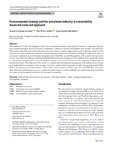Environmental strategy and the petroleum industry: a sustainability balanced scorecard approach

Use this link to cite
http://hdl.handle.net/2183/32804Collections
- Investigación (FEE) [923]
Metadata
Show full item recordTitle
Environmental strategy and the petroleum industry: a sustainability balanced scorecard approachDate
2022Citation
Fernández-González, R., Puime-Guillén, F. & Vila-Biglieri, J.E. Environmental strategy and the petroleum industry: a sustainability balanced scorecard approach. J Petrol Explor Prod Technol 13, 763–774 (2023). https://doi.org/10.1007/s13202-022-01543-9
Abstract
[Abstract] The institutional framework designed to protect the environment demands a growing involvement of companies. The new environmental paradigm drives the business community to embrace corporate sustainability more broadly and effectively. This trend is especially pronounced in the petroleum sector since, to a greater degree than in other industries, modern society demands that wealth creation be conducted while guaranteeing social and environmental wellbeing. To achieve this aim, it is necessary to implement an environmental management model that links sustainability planning with a control and supervision system. One of the most effective is the Sustainability Balanced Scorecard approach. This method will be used in this article to evaluate the sustainable performance of a Spanish company whose activity is focused on the marketing and distribution of petroleum products. The objective of this article is to analyze the environmental management of the hydrocarbon company and whether the four perspectives of its strategic vision have satisfactorily incorporated variables that promote sustainability. 2021 is the reference year for the indicator values, which will be compared with the target values for 2022. The results show that, while financial performance reveals a margin for improvement, as well as staff education and training in sustainability, the degree of environmental satisfaction of consumers is acceptable.
Keywords
Sustainability balanced scorecard adoption
Petroleum industry
Spain
Strategy implementation
Sustainability transition
Petroleum industry
Spain
Strategy implementation
Sustainability transition
Editor version
Rights
Atribución 4.0 Internacional
ISSN
2190-0566






